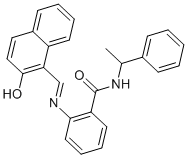All AbMole products are for research use only, cannot be used for human consumption.

Sirtinol is a specific NAD-dependant class III histone deacetylase sirtuin inhibitor targeting human Sirt1 and Sirt2 with IC50 of 131 μM and 38 μM, respectively. Sirtinol is slightly less potent against recombinant yeast Sir2p with IC50 of 68 μM. Sirtinol does not affect HDAC1 activity at 50 μM, suggesting that it specifically inhibits sirtuin deacetylase activity. Unlike TSA, Sirtinol treatment does not cause HeLa cells to change from a rounded morphology to a flattened morphology. Consistently, TSA causes robust acetylation of histones H3 and H4, as well as α-tubulin, whereas Sirtinol does not produce any of these effects. Treatment with Sirtinol inhibits body-axis formation and vascularization in Arabidopsis. Although Sirtinol (100 μM) has no axonal toxicity on uninjured axons, it effectively blocks NAD-dependent axonal protection (NDAP) after transection, indicating that Sirt1 proteins are likely effectors of this process. Sirtinol significantly increases mononucleosomes and oligonucleosomes in the cytoplasm of cardiac myocytes, a sensitive marker of apoptosis, and induces cleavage of caspase-3 almost equally as H2O2. [3] Sirtinol induces senescence-like growth arrest in human breast cancer MCF-7 cells and lung cancer H1299 cells, characterized by induction of senescence-associated β-galactosidase activity and increased expression of plasminogen activator inhibitor 1 Sirtinol-induced senescence-like growth arrest is accompanied by impaired activation of Ras-MAPK pathways but not Akt/PKB in response to epidermal growth factor (EGF) and insulin-like growth factor-I (IGF-I). Similar to Nicotinamide, Sirtinol inhibits the growth of MiaPaAa-2, BxPC-3, SOJ-6, and HeLa cells with IC50 of 48.1 μM, 48.5 μM, 48.4 μM, 53.9 μM, respectively.

J Hepatol. 2022 Nov 9;S0168-8278(22)03285-8.
Hepatocyte-specific Mas activation enhances lipophagy and fatty acid oxidation to protect against acetaminophen-induced hepatotoxicity in mice
Sirtinol purchased from AbMole
| Cell Experiment | |
|---|---|
| Cell lines | LNCaP, 22Rv1, DU145, and PC3 |
| Preparation method | Growing cell to 60% confluence and then treating them with 30 μM or 120 μM sirtinol for 24 or 48 hours. Cells are trypsinized and collected. The cells are pelleted by centrifugation and resuspended in PBS (120 μL). Adding trypan blue (0.4% in PBS; 10 μL) to a smaller aliquot (10 μL) of cell suspension, and the number of cells (viable unstained and nonviable blue) are counted. |
| Concentrations | Dissolved in DMSO, final concentrations ~120 μM |
| Incubation time | 24 or 48 hours |
| Animal Experiment | |
|---|---|
| Animal models | Male Sprague-Dawley rats subjected to trauma-hemorrhage |
| Formulation | Dissolved in DMSO, and diluted in saline |
| Dosages | 1 mg/kg |
| Administration | Administered intravenously |
| Molecular Weight | 394.47 |
| Formula | C26H22N2O2 |
| CAS Number | 410536-97-9 |
| Solubility (25°C) | DMSO 10 mg/mL |
| Storage |
Powder -20°C 3 years ; 4°C 2 years In solvent -80°C 6 months ; -20°C 1 month |
[1] Qing Ye, et al. Sirtinol regulates the balance of Th17/Treg to prevent allograft rejection
[5] Jos M Villalba, et al. Sirtuin activators and inhibitors
| Related Sirtuin Products |
|---|
| SIRT1-IN-1
SIRT1-IN-1 is a selective SIRT1 inhibitor with an IC50 of 0.205 μM. |
| Sirtuin-1 inhibitor 1
Sirtuin-1 inhibitor 1 is an inhibitor of Sirtuin-1 that plays important roles in obesity-induced diabetes and aging-related diseases. |
| ADTL-SA1215
ADTL-SA1215 is a first-in-class, specific small molecule activator of SIRT3 that modulates autophagy in triple-negative breast cancer. |
| SIRT2/6-IN-1
SIRT2/6-IN-1 is a SIRT6/SIRT2 inhibitor, with IC50s of 106 μM and 114 μM. |
| SIRT6-IN-2
SIRT6-IN-2 is a selective SIRT6 inhibitor (IC50: 34 μM). |
All AbMole products are for research use only, cannot be used for human consumption or veterinary use. We do not provide products or services to individuals. Please comply with the intended use and do not use AbMole products for any other purpose.


Products are for research use only. Not for human use. We do not sell to patients.
© Copyright 2010-2024 AbMole BioScience. All Rights Reserved.
